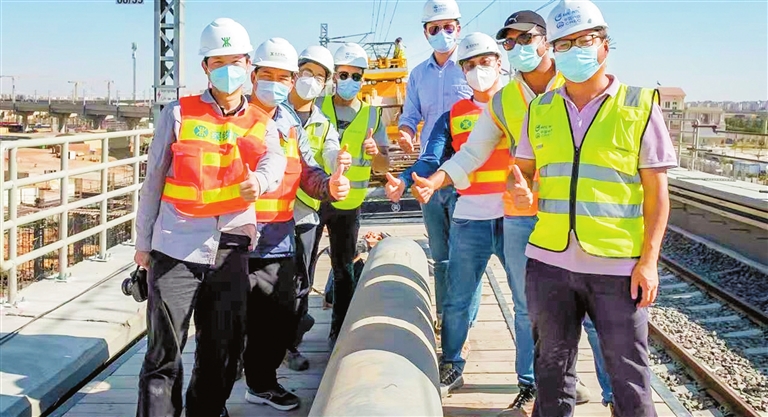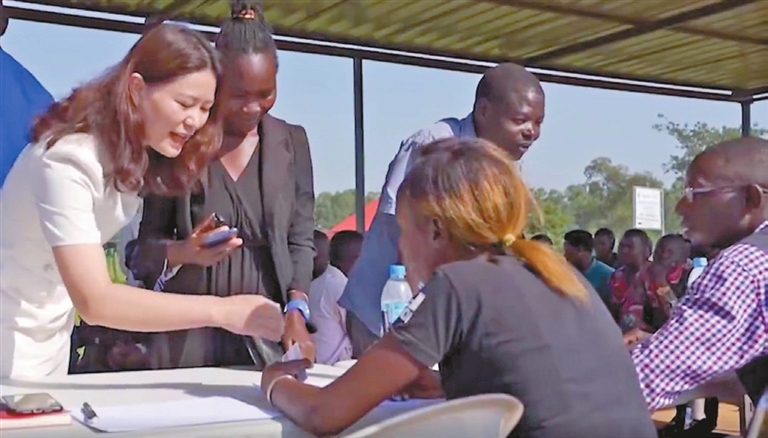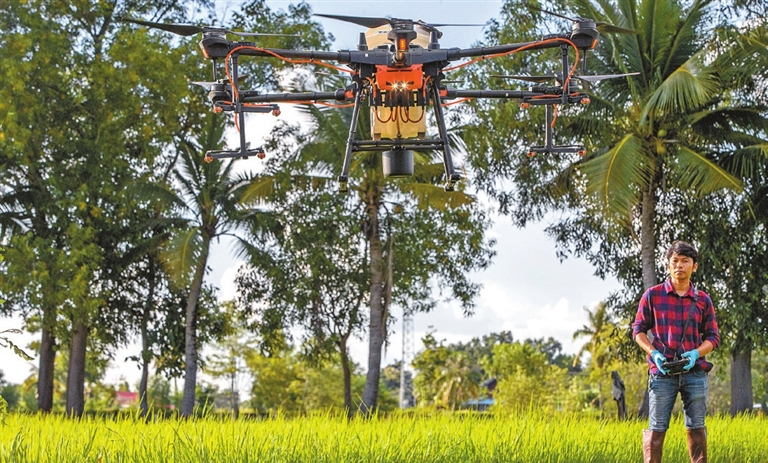


Han Ximin 1824295095@qq.com SHENZHEN enterprises, producing items such as electronics like mobile phones, making infrastructure investments in transportation and power supply, and building industrial parks in various countries, have been actively participating in and contributing to the Belt and Road Initiative (BRI). Phone making Chen Lijuan, founder of Shenzhen smartphone brand MIONE, has been busy in recent months recruiting skilled workers for two new assembly lines slated to be put into operation at the Sino-Uganda Mbale Industrial Park in Kampala, capital of Uganda, this month. The company, founded in 2015, set up a factory in Uganda in 2022, becoming the first smartphone manufacturer in the African country, with a monthly capacity of producing 200,000 units. Due to high import tariffs, smartphones in Uganda generally cost 20% higher than those sold in the neighboring countries. One way to address this issue is to localize, and Chen is focusing on this to reduce costs and improve competitiveness. “We collect feedback from users and distributors here, and send them back to the headquarters in Shenzhen, which will then provide technical support,” she said. So far, about 70 Chinese enterprises have settled in the Mbale park. In Uganda, China is the largest source of foreign capital, with over 600 Chinese-funded enterprises, according to a Shenzhen Media Group report. Another Shenzhen phone brand making its waves in the African market is Transsion. Though not a well-known domestic brand, it secured a spot on the top three in the global market, with a shipment of 156 million units in 2022, capturing 40% of the market share in Africa, according to International Data Corp. Transsion won its customers with the “deep skin image” technology. “This technology ensures contrast clarity between the foreground and background in portraits,” Zhou Fanyi, manager of Transsion’s vision product department, said at an interview. The firm began to expand in Bangladesh in 2017. This time, the company added a “gesture controlled function.” “Bangladeshis/Bengals have a tradition of using their right hands to eat rice, which makes their fingers greasy when answering phones. When they answer, they’ll always need to wash their hands first, leading to missed calls. So, we developed technologies using gestures to answer calls,” Cui Wenjun, manager of Transsion’s Bangaldesh market, said. Transsion set up its first factory in Bangladesh in 2018, with a production capacity of 400,000 units a month and creating 2,000 jobs. The sales of its products took the lead with 21.5% market share in the country. Drone farming Rice, the staple crop that has nourished human civilization for thousands of years, has been cultivated from the middle and lower reaches of the Yangtze River, to the Korean Peninsula, Japan, Southeast Asia, West Asia and the whole Eurasian region. The “rice road” has a history longer than the ancient Silk Road. In Thailand, the world’s largest rice exporter, Huang Zeng-lun from Shenzhen-based DJI has been busy on this “rice road” with drone farming technologies. (Continued on P4) (From Page 2) Thailand is the first country that DJI Agriculture has sent employees to explore the market, and Huang was the company’s pioneer in covering over half of the country’s 70 provinces since 2019. “With the help of drones, the farmers can spray pesticide around 200 rai (320,000 square meters) a day, 10 times in size over the traditional manual spray,” Huang said. However, Huang found out it was difficult to increase their sales. According to their market research, distributors and farmers prefer using locally made drones because it is easier to deal with after-sales services. DJI drones would take a longer after-sales service, so Huang sent this feedback to the Shenzhen headquarters, and shortly thereafter, a training based after-sales mode was established in Thailand. Infrastructure investment On the shore of the Gulf of Guinea, there is a park named after Shenzhen. This is a place where Ghanaians like to gather to play soccer. A few years ago, they can only play during the daytime, because it was totally dark at night. Ghana suffered economic losses from electricity shortages, costing 2% of its GDP or amounting to around 4 billion yuan (US$547.23 million) in the past years. This situation changed when Senergy Associated Power (Ghana) Ltd., a project partly funded by Shenzhen Energy Group, was officially put into operation in 2017. With an installed capacity of 560 megawatts, the company has covered 20% of Ghana’s total power supply. The power plant benefited 2 million people and provided 300 job opportunities in the area. According to statistics, Shenzhen Energy Group has invested a total of 4.5 billion yuan in Ghana and Vietnam, helping improve their local economies and creating job opportunities. In July last year, the 10th of Ramadan Railway in Egypt, assisted by AVIC International, China Railway and Shenzhen Metro Group, was officially put into trial operation. The line links Cairo, capital of Egypt, the 10th of Ramadan and Egypt’s new administrative capital, providing transportation for nearly 5 million people. Shenzhen Metro Group signed an agreement in 2019 to provide a two-year operation supervision for the intercity railway. Statistics also show that Shenzhen’s State-owned enterprises have implemented and completed 17 projects in nine BRI countries including Vietnam, Egypt, Ghana, Ethiopia, Israel and the UAE. The projects cover transportation, power supply, industrial parks, high-end manufacturing and modern services. | 
